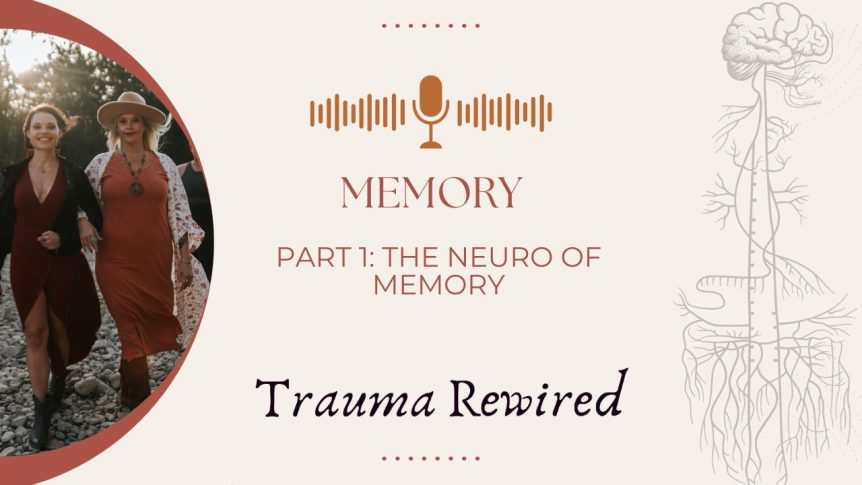
Have you ever wondered what it truly means when we say “trauma lives in the tissues” or that “the body keeps the score”? These phrases often circulate in the healing world but can feel abstract and elusive. We are unraveling these concepts in our latest episode of Trauma Rewired.
Have you ever felt a deep, inexplicable sense of unease or discomfort, only to realize it’s linked to a past event you can’t fully recall? This phenomenon is at the heart of somatic memory. Trauma isn’t just a psychological phenomenon; it embeds itself into our nervous system and body, influencing how we feel and react long after the initial event.
Memory repression is a huge issue for people with complex trauma. Our social context, power disparities, and neurological factors affect the encoding, retrieval, and understanding of our memories. This insight opens the door to a deeper understanding of how trauma impacts us on multiple levels – especially how somatic memories impact our experience of the world in the NOW.
We deep dive into all this and more in this episode! In fact, this was such a big topic, we split the episode in two parts. Listen to Part 1: The Neurology of Memory today and then keep an eye out Friday for Part 2: Somatic Memory!
Episode highlights:
Memory Repression and Trauma
- The impact of complex trauma on memory repression.
- Social power and neurological factors influencing memory encoding and retrieval.
- The societal norms dictating what is appropriate to remember and disclose.
Somatic Memory
- The concept of the body remembering traumatic events even when the mind does not.
- Insights into somatic experiences during psychedelic healing.
- The importance of developing interoceptive skills and understanding bodily sensations.
Neurological and Hormonal Factors
- How stressful situations impact the sympathetic nervous system and hormone production.
- The role of the HPA axis in chronic stress and trauma.
- The connection between prolonged stress, hormone imbalance, and physical health issues.
Endogenous Opioids
- The role of opioid activity in social relationships and emotional well-being.
- The effects of childhood abandonment and neglect on opioid receptor activity and mental health.
Neuropeptides and Emotions
- The influence of emotions on neuropeptide activity and cellular communication.
- How emotional states can affect overall health and immune function.
Cellular Memory
- Emerging research on cellular memory and its implications for trauma storage.
- The theory that traumatic experiences can be stored in cells as raw imprints.
- How unprocessed trauma at a cellular level can influence mental and physical health.
The revelation here is kind of profound: our nervous system, bodies and cells hold onto past traumas, shaping our present experiences and health. The resolution lies in our ability to harness neuro-somatic tools to heal and rewire our responses.
If you would like to WATCH the episode and/or have closed captions, check out our Trauma Rewired YOUTUBE channel!
If you need access to transcripts of this episode, you can find that HERE on Apple Podcasts.
Get started training your nervous system with our FREE 2-week offer: https://www.rewiretrial.com